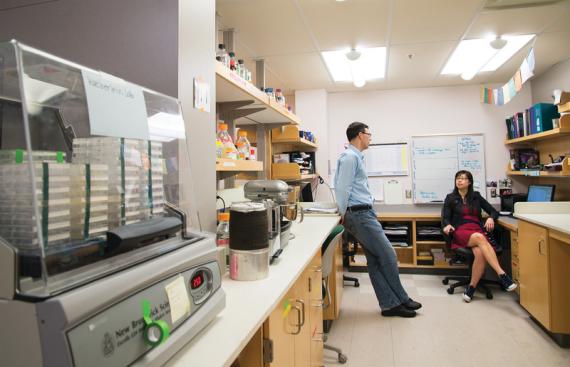The UW ADRC Research Education Component (REC) Trainee program provides a broad-based training in the clinical presentation and course of Alzheimer’s disease and Alzheimer's disease-related dementias (AD/ADRDs) in addition to the basic, translational and clinical research approaches used in their study. Designed to complement participants’ ongoing training, this program provides 6-10 REC Trainees each year with a cohort-based introduction to the basics of AD/ADRD, orientation to the use of data and resources available through the UW ADRC cores, and access to scientific and research environment of the UW ADRC.
Now accepting applications for the 2025-2026 UW ADRC Research Education Component (REC) Trainee and Investigator cohorts! If you would like to apply to either, please submit a 1-page personal statement detailing your motivation for participating in the program, your NIH-style biosketch, and a statement of support from your present research mentor (for Trainees) or specific aims page(s) for funded, pending or upcoming ADRD-focused grants (for Investigators). Submit these to Molly Chinn (wamble@uw.edu) by Friday, August 15, 2025.
Three key benefits of participation in the UW ADRC REC Trainee program are:
- Didactic and practical training in AD/ADRD and related research approaches, as well as an introduction to accessing research resources developed with the UW ADRC.
- Introductions to and ongoing interactions with leaders in UW AD/ADRD research. For trainees embarking on Alzheimer’s-related research, these investigators are their future collaborators, co-mentors, consultants, and Letter of Support writers.
- For trainees seeking F, K funding in Alzheimer’s-related subjects, participation in the REC Trainee program provides a strong starting point for mentorship and training plans. For those seeking R-level funding, it is a strong step towards demonstrating active participation in the institutional Alzheimer’s-related scientific environment.
Participants
The UW ADRC REC Trainee program was designed to support graduate students, postdoctoral fellows, medical residents and fellows, and junior faculty conducting research on subjects connected to ADRD.
Elements
- AD@UW: A monthly lunchtime (lunch provided) discussion of a different topics in ADRD, including details of how to access related UW ADRC resources. These sessions are guided by ADRC leaders, offering trainees both an informal opportunity to learn the basics of ADRD and UW ADRC resources, but also a valuable introduction to established leaders in our local ADRD community. Also available by Zoom for participants off site or at other institutions.
- UW ADRC Scientific and Research Environment for distributed REC Trainees: The UW ADRC community is home to an outstanding array of weekly, monthly and quarterly seminars, workshops and journal clubs related to ADRD. These include the UW ADRC ‘Towards Precision Medicine’ seminar series, the Neuropathology Research in Progress seminar series, the Neuropathology Clinico-Pathologic Conference (CPC), the Alzheimer’s Disease Training Program T32 Special Topics seminar series and journal club. REC Trainees located across the different UW campuses, or located at other campuses nationwide, will be provided real-time access to these events through Zoom-based video conferencing. To be added to the This Week in Alzheimer's Talks and Events email update, please email Genevieve Wanucha at gwanucha@uw.edu.
- UW ADRC Research Symposium: REC Trainees will be invited to participate in the annual UW ADRC Research Symposium, which includes a poster session, investigator and trainee talks, and networking opportunities. Participating REC Trainees will be eligible for travel support to AD/ADRD-relevant conferences.
- ADRD Open Neuroscience Workshop: Webpage Coming Soon: REC Trainees will be granted priority in registering for the annual UW ADRC Open Neuroscience Workshop help each spring beginning in 2021. During this two-day immersive workshop, participants will receive guided hands-on group-based introduction to publicly available datasets, their origins and structures, user interfaces, visualization and statistical tools necessary to leveraging these resources in participants’ own research projects. These workshops will be supported by expert staff from partnering open neuroscience organizations such as SAGE Bionetworks.
